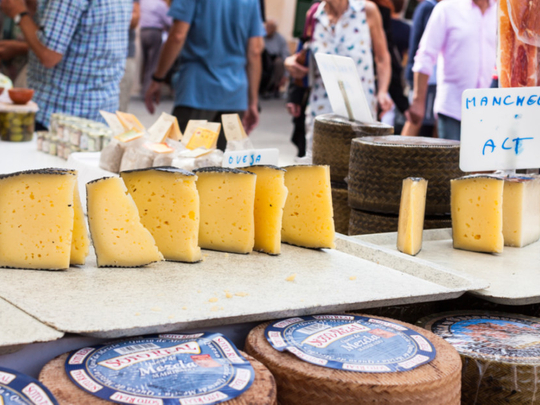
London: One is a revered sheep’s milk cheese, as Spanish as the napkin-strewn floor of a tapas bar.
The other is a mild cow’s milk cheese, sometimes bulked out with vegetable oil, which is sold cheaply in Mexican supermarkets and stuffed into quesadillas.
The two cheeses share a name, Manchego, but they have about as much in common as a Spanish tortilla and its Mexican namesake. That is how they have come to be at the centre of a standoff that is slowing down a major trade deal between Mexico and the European Union.
Manchego makers in Spain say their product has a denomination of origin and want Mexican cheeses to stop carrying the same name.
Ismael Alvarez de Toledo, president of the Spanish Brotherhood of the Manchego Cheese, is adamant that there is only one product worthy of the name — and it is made from the milk of sheep in the region of La Mancha.
‘Fake name’
“[Mexican Manchego] is an insipid cow’s milk cheese that sometimes doesn’t even look like a cheese because it sometimes comes in slices for making sandwiches,” he said. “The only thing it’s got in common with our cheese is the name. But it’s a fake name.”
This dogged defence is now dragging down negotiations to update a trade deal between Mexico and the EU that was signed in 2000. In the face of an uncertain future for the North American Free Trade Agreement, as Mexico attempts to diversify its trade away from the US, the deal is now being revised and broadened.
The EU had hoped revisions would be agreed before Christmas. But despite a three-day visit to Brussels by the Mexican economy minister, Ildefonso Guajardo, a deal could not be struck.
Geographical indications are jealously guarded by EU member states. A decade ago, the Spanish government made strident appeals for the European commission to take action against Belgium after it emerged that a cheese manufacturer there was selling an “imitation” product, Queso Manchego. That is a brand name that since 1996 has been tied to cheeses made in Spain.
Mexico is fiercely protective of its own denominations of origin such as those for tequila and mescal liquor. But the country’s dairy industry does not express the same anxiety about protecting regional cheeses.
“Mexico is more like the US in that we focused more on brands,” said Rene Fonseca, general director of the National Milk Industries’ Chamber. “We’ve not worried about protecting generic names.”
If anyone is to blame for the confusion, Fonseca argues, it is the Spanish conquistadores who brought the name Manchego to Mexico. “Europeans themselves gave it this name. There’s no attempt here to trick anyone.”
Price difference
But Alvarez insisted the confusion led to real losses for Spanish producers, especially in the American market.
“If we try to sell cheese in Miami — or anywhere where there’s a Mexican influence — and say, ‘Right, here’s our Manchego for $15 (Dh55) a kilo,’ people are going to say, ‘But we can get Manchego for $7! (Dh25)’”
Santiago Altares, secretary of the Manchego Cheese Denomination of Origin Regulatory Commission Foundation, said Spain exported around 80 tonnes of Manchego to Mexico in 2016 alone. “The suggestion that it’s a generic term is a fallacy,” he said. “These people in Mexico are trying to take advantage of the name, reputation and fame of Manchego cheese for their own economic benefit.
“It’s a fraud and a swindle.”
— Guardian News
& Media Ltd












